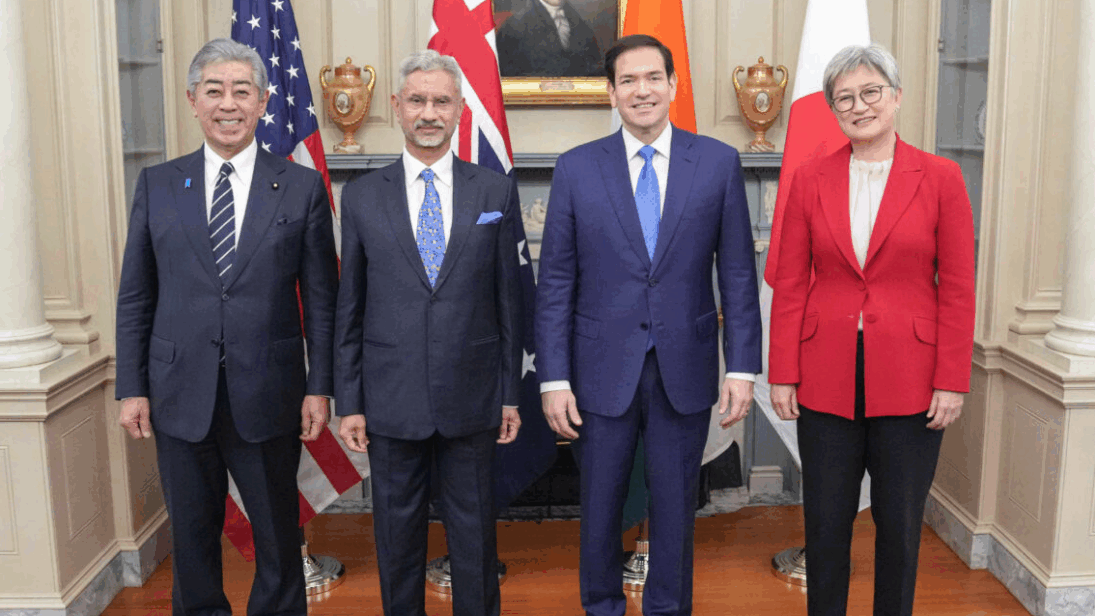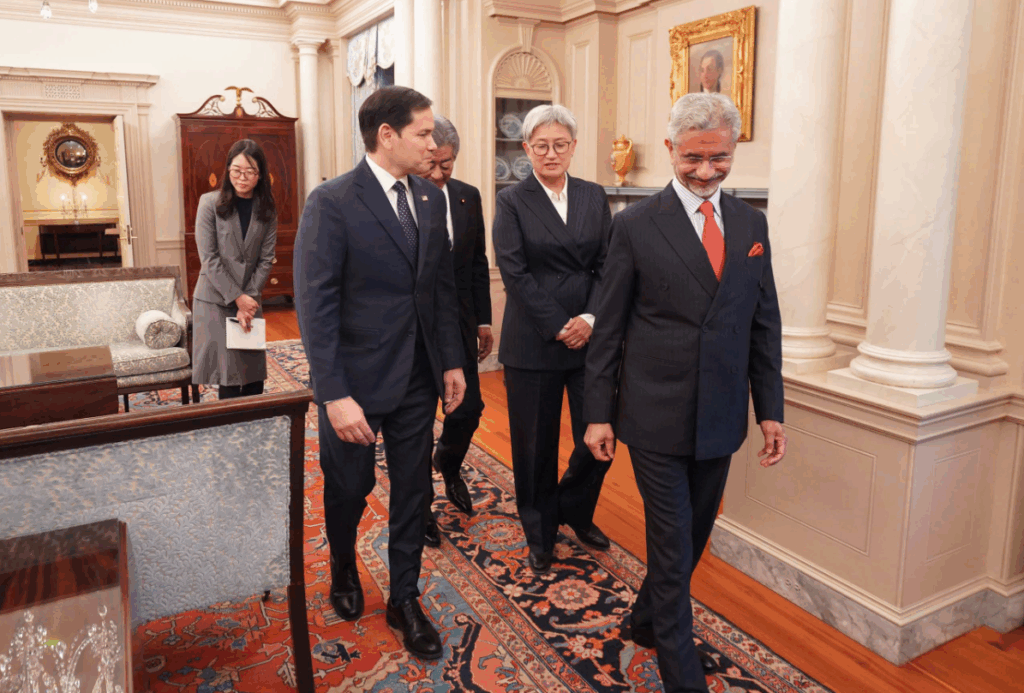
Earlier this month, the Quad took an unprecedented stand on the issue of terrorism at the foreign ministers’ meeting in Washington. The joint statement condemned “all acts of terrorism and violent extremism in all its forms and manifestations, including cross-border terrorism” and renewed its commitment to focus on counterterrorism cooperation, a pillar of the grouping that has not received much attention in recent years. For India, the host of the 2025 Quad leaders’ summit later this year, this statement was a diplomatic win on two counts—first, New Delhi was able to convince the other members to issue a strong condemnation of the recent terror attack in Pahalgam in Indian-administered Kashmir; and second, the statement called for UN member states to cooperate under international law and relevant UN Security Council resolutions against the “perpetrators, organizers, and financiers” of the attack, purportedly a reference to Pakistan. However, this symbolic gesture of calling out terrorism as a shared challenge is only the beginning. If India and the Quad are serious about counterterrorism cooperation, the member states will have to take concrete steps to further their engagement on the issue in the region.
Pahalgam and India’s Continuing Terrorism Concerns
The April 22 attack in Pahalgam and the ensuing India-Pakistan kinetic crisis has once again brought to the fore the threats from terrorism in the region and the bandwidth required to address them, even as New Delhi engages with partners on a broader strategic agenda.
While terrorist incidents in Indian-administered Kashmir have declined in recent years, Indian experts have raised the crucial point that local terrorism has gone up considerably and claim that there are comparatively more attacks linked to or supported by Pakistan-based groups in recent years. The Pahalgam attack was especially heinous since it targeted civilians and segregated victims based on gender and religion. And while Pakistani leadership steadfastly denies any involvement of their country in the attack, The Resistance Front (TRF)—which India considers a proxy of the Pakistan-based terrorist organization Lashkar-e-Taiba—claiming responsibility has made this a cross-border issue from New Delhi’s perspective and another in a string of attacks over the years linked to Pakistan.
If India and the Quad are serious about counterterrorism cooperation, the member states will have to take concrete steps to further their engagement on the issue in the region.
Thus, on May 7, India responded to the Pahalgam attack with what it claimed was a “targeted campaign to dismantle the terror infrastructure across the Line of Control and deeper inside Pakistan,” which invited a response from Pakistan and descended into a four-day conflict. Fought under the nuclear overhang, this undeclared war between India and Pakistan from May 7 to 10 was meant from New Delhi’s point of view to not only call out Pakistan’s nuclear bluff but also change the Indian red lines for terror response. It demonstrated a no-contact war model using drones, missiles, air defense systems, and aircraft to achieve military objectives. But most importantly, Indian Prime Minister Narendra Modi stressing that Operation Sindoor was India’s new normal and that a disproportionate response against terrorist attacks will be the norm in the future underlines the strategic shift in Indian thinking that the Quad will have to account for.
Quad Members’ Response
Despite the Quad’s stated alignment on the importance of countering terrorism, the group initially lacked a coordinated response in the wake of the Pahalgam attack. Quad members Australia and Japan—along with several other countries—conveyed their condolences on the attack, but did not do much else. At the bilateral level, the United States had somewhat mixed messages throughout the conflict. While Washington expressed its support for the victims in Pahalgam, U.S. leadership also indicated initially that they were not interested in being pulled into the conflict. The U.S. response became more involved as the conflict seemed to escalate, with President Trump announcing on social media that he had helped mediate a ceasefire between India and Pakistan and was willing to support on resolving the Kashmir dispute. This caused much frustration in India, because New Delhi has consistently maintained that Kashmir is a bilateral India-Pakistan issue and does not warrant third-party mediation. President Trump repeatedly claiming that the United States had used halting trade as a bargaining chip with India to stop military action was also seen in New Delhi as antithetical to Indian interests and future U.S.-India cooperation.

But the Quad foreign ministers explicitly renewing their commitment to counterterrorism at the July summit can be seen as a first major step towards the grouping’s coherence on the issue. For New Delhi, given the Quad’s avowed focus on counterterrorism, its leaders can do more to walk the talk when it comes to supporting India’s efforts, such as strengthening Indian defense and diplomatic capabilities. But broadly, terrorism is a deep-seated regional and global issue with wide-ranging impacts, and so it needs a unified response in a multilateral setting. Taking Pahalgam into context, the Quad can develop a stronger stance against terrorism and work together to address the issue, by not only aligning individual or bilateral responses but thinking through multilateral steps.
Quad’s Engagement on Counterterrorism and Next Steps
The Quad has a broad mandate focused on multiple security priorities in the Indo-Pacific, including counterterrorism, and has a history of cooperating on this issue, given it is one of the pillars of this partnership. In 2019, India’s National Investigation Agency conducted the first Quad Counterterrorism table top exercise to exchange information on best practices and further interagency cooperation between member nations. As recently as 2023, the Quad hosted its first Counterterrorism Working Group (CTWG) to discuss counterterrorism threats and best practices as well as how the group can “work together to mitigate acts of terrorism through information sharing, consequence management, and strategic messaging.” The working group also covers wide-ranging dimensions related to terror activities such as use of unmanned systems and chemical, biological, radiological, & nuclear devices, as well as the internet. The Quad CTWG had agreed on innovative ways of deepening cooperation, such as through “technical workshops and engaging with non-Quad members with established CT expertise.” However, despite a dedicated counterterrorism mechanism, the Quad has made little progress on these initiatives.
Terrorism is a deep-seated regional and global issue with wide-ranging impacts, and so it needs a unified response in a multilateral setting.
As India looks to host the Quad leaders’ summit later this year, New Delhi may put both diplomatic and operational level cooperation on counterterrorism on the agenda, especially as it seeks support from like-minded nations. The Quad is an existing framework where initial efforts are ongoing already and New Delhi may leverage the counterterrorism vertical to seek commitment from member states through a strong statement as well as continuing counterterrorism exercises. While India’s kinetic deterrence by punishment response after Pahalgam may be effective in the short- to medium-term, the ongoing risks of conflict and future escalation remain high. Thus, to make deterrence more effective and impactful, it may also seek to marshal international pressure against Pakistan to compel it to address the roots of terrorism. Indian Defence Minister Rajnath Singh’s refusal to sign the SCO joint statement recently showcases India’s determination to tackle the issue of counterterrorism at the multilateral level.
However, irrespective of whether a Quad member is a victim of an attack or not, the Quad CTWG must continue to conduct exercises, and invest in intelligence sharing, information exchanges, and training to strengthen this pillar of cooperation. Terrorism is a regional concern faced by many Indo-Pacific partners and an issue on which China is using questionable resources and practices, such as through the Global Security Initiative, to gain strategic influence. Investing in counterterrorism cooperation as a regional and global good would hold the Quad in good stead as an enabler of peace and stability in the region.
Views expressed are the author’s own and do not necessarily reflect the positions of South Asian Voices, the Stimson Center, or our supporters.
Also Read: How the United States and India can Promote Responsible Behavior in Cyberspace Through the Quad
***
Image 1: U.S. Embassy in India
Image 2: Secretary Marco Rubio via X


